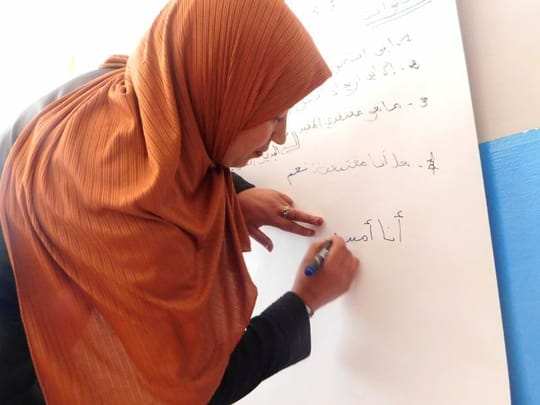Morocco: Literacy program empowers women toward sustainability

Following International Women’s Day on 8 March 2023, the High AtlasFoundation (HAF) collected the highlights and milestones from the first year oftheir Family Literacy program in Morocco.The program included empowerment workshops, literacy classes and business andagricultural training for over 1,000 women from rural areas, giving them a chance toimprove their lives and the lives of their families and communities.
Last year, the women—in groups from 40 different communities throughout the Beni
Mellal-Khenifra and Marrakech-Safi regions—joined together to discuss their goals and
dreams, contributing their individual voices to group decision-making. Each group completed a four-day, rights-based “Imagine” workshop of self-discovery, reflecting on and gaining insight into their innermost desires for their futures.
Furthering literacy in pursuit of sustainability
The women began the journey of furthering their education through literacy classestaught by women from their own villages who were trained through the National Agencyfor the Fight Against Illiteracy. And they started and grew business cooperatives to sellgoods for additional household income.
In this second year of the program, the women will continue with their literacy lessonsand the development of their cooperatives.
Preschool lessons for their children will also commence. By learning together and readingtogether at home, the concept of ongoing family literacy is anchored within thehousehold and throughout the community.
Through the program, women are also empowered to become models of achievement forother women, inspiring their family members and mobilising their communities towardsustainability.
Family literacy in numbers: Year 1
40 cooperatives and women’s groups participated in four-day Imagine empowerment
workshops addressing seven life areas
48 women’s groups engaged in participatory community planning
42 community learning centres created
37 rural women trained as literacy teachers by the National Agency for the Fight
Against Illiteracy
20 university students trained to assist the literacy teachers
Thousands of books, markers, and other school supplies were distributed to women in
more than 40 communities
966 rural women were tested to determine literacy levels and engaged in six months
(144 hours) of literacy classes
27 workshops conducted in agricultural skills by the USAID Farmer-to-Farmer program
and in managing business cooperatives by the Office for the Development of
Cooperation
Women embracing collective entrepreneurship
Having attended self-empowerment workshops, women participating in the FamilyLiteracy program have shown great interest in making a change for the better. Inattending literacy classes, they’ve expressed genuine enthusiasm about learning tospeak, read and write in the Arabic language. And having learned how to establish theirown cooperatives, they’re now doing just that.In Khenifra, for example, women are already collaborating on new, empoweringendeavours. With a knack for making traditional Moroccan pastries, bread and cerealproducts, some of these women have decided to together establish an agriculturalcooperative, calling it Tamlalt, that will grow plants and raise livestock.Another group has decided to use their artisanal skills to create an industrial cooperativenamed Alahed Aljadid, which produces traditional clothing. They have already begun tomarket their products.